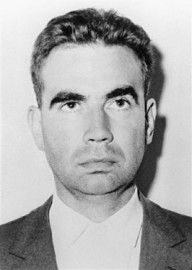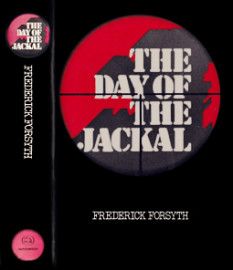The idea to write The Day of the Jackal came to Frederick Forsyth while covering for Reuter an assassination attempt made on French President Charles de Gaulle on 22 August 1962 by a senior French army officer, Jean Bastien-Thiry. The officer was involved with a mysterious organization, known as Vieil État-Major, somehow connected with the Organisation de l’armee secrete (OAS), which led the armed opposition to de Gaulle’s policy in Algeria and against FLN terrorism.
On 22 August 1962, De Gaulle’s car, a Citroen DS and some shops were sprayed with machine gun fire. De Gaulle, his wife and entourage escaped uninjured but some policemen escorting them were killed. After the attempt, holes from fourteen bullets were found in the president’s vehicle, one of which barely missing the president’s head by a few centimetres; another twenty were found to have struck the nearby Cafe Trianon while an additional 187 spent shell casings were on the pavement.
Bastien-Thiry was arrested and brought to trial before a military tribunal on 28 January 1963. He had not been part of the commando but claimed that the death of De Gaulle would have been justified by the ‘genocide’ of the European population of newly independent Algeria and the killing of several tens of thousands of mostly pro-French Moslems by the FNL.
Bastien-Thiry, who had been certified ‘normal’ by psychiatrists in spite of a history of clinical depression, was convicted and sentenced to death, as were two of his associates: Lt de la Tocnaye and Prevost (a former volunteer in Korea and in Vietnam). The only would-be assassin to escape was OAS member Georges Watin (also known as “The Limp”), who died February 1994 at age 71. De Gaulle was close to the father of Bastien-Thiry and would have been inclined to pardon him, as he first announced to the press, but during the trial Bastien-Thiry mocked the President. People like De Gaulle may forgive a killing attempt but do not forgive mocking. The execution took place one week after the trial, by firing squad, on 11 March 1963. While clutching to his rosary, the 35 years old Bastien-Thiry refused to be blindfolded and bravely faced death.

The novel written by Forsyth starts at this point with the surviving French conspirators deciding to hire a British assassin to kill the President on the next 25 August, the day commemorating the Liberation of Paris during WWII. A French police superintendent suspecting what was going on started to investigate and at the end managed to kill the Jackal and save De Gaulle.
For two years – prior to write The Day of the Jackal – Frederick Forsyth covered the Biafran War in West Africa. Upon returning to Britain his first book, the non-fiction The Biafra Story: The Making of an African Legend described that brutal civil war during which Nigeria fought to prevent the secession of its eastern province. It was published as a paperback by Penguin Books in late 1969 but to Forsyth’s disappointment, the book sold only few hundred copies.
By 1970 the 31-year-old freelance journalist, international adventurer, MI6 spy and former fighter pilot in the RAF, found himself out of work and ‘flat broke’. To solve his financial problems he thus decided to try his hand at fiction, having in mind the millions made by Ian Fleming with his James Bond novels, as a way to clear his debts which had been piling up.
Forsyth wrote The Day of the Jackal in 35 days between January and February 1970, but then the manuscript remained unpublished for almost a year-and-a-half as he sought a publisher willing to accept it.
He had no literary agent and four publishing houses flatly rejected it because they believed a fictional account of the OAS hiring a British born assassin in 1963 to kill Charles de Gaulle would not be commercially successful, because De Gaulle was still alive and retired from public life! They opined that the readers would know since the beginning that the killing plot was not going to work. But then by sheer luck (Forsyth’s luck!) Charles de Gaulle died of natural causes in November 1970, perhaps was this that eventually persuaded London based publishers Hutchinson to give a try to it.
Before publication rumours of the content of the book created a craving for it. Hutchinson reacted by increasing the minimum numbers of copies: from the initial 8.000 to 100.000. They were all sold in a few weeks and an American publisher (Viking) bought the rights for 365,000 USD, a huge amount which could be compared to 2.000.000 USD in today’s money.It has since been translated in various languages and remains a sensational editorial success, being still in print.
A wonderful Anglo-French film was released in 1973, directed by Fred Zinnermann with Edward Fox impersonating the Jackal, a human chameleon who plans his mission meticulously, evading capture, mercilessly killing anyone who stands in his way and finally, being shot by the police superintendent, he is put to rest in an anonymous grave. This film went on to win the BAFTA Award for Best Film Editing (Ralph Kemplen), five additional BAFTA Award nominations, two Golden Globe Award nominations, and one Academy Award nomination. The film grossed $16,056,255 at the box office and earned an additional $8,525,000 in North American rentals.

Freddy Forsyth went on to write several other masterpieces, like The Fourth Protocol; The Dogs of War; The Odessa File; The Fist of God; The Devil’s Alternative; Icon; just to quote some and became a millionaire in the process, but lost most of it, getting back to being flat broke. As he declared on October 2009 in an interview to The Telegraph:
“My second mistake was trusting Roger Levitt. I saw him as a personal friend, but he turned out to be a con man. He wasn’t like Bernard Madoff — Levitt never promised ridiculous levels of return. His talent was to recommend a portfolio of about 20 shares and then suggest that, since there was a lot of paperwork and you would have to sign 20 cheques, why not let him do it for you? You just gave him one cheque payable to the Levitt Group and he promised to do all the hard work, but in fact I never saw the money again. At last count in 1988 my portfolio was worth around 2.2m. I know that because I parted with my wife that year and, because we didn’t want to quarrel, I gave her my properties while I took the shares. Then a few years later Levitt was arrested and my portfolio turned out to be worthless — so I went from having been worth 4.6m before my divorce to zero.” Honore de Balzac comes to mind but there is a long list if authors being world-savvy in their novels but easily duped in real life!
Forsyth had since gone back to work as a writer, a political commentator and journalist and he had since rebuilt, once more, his fortune.

